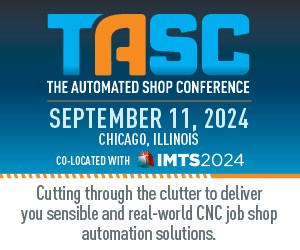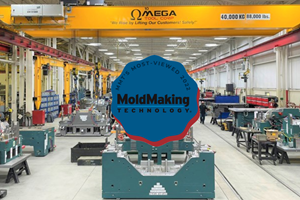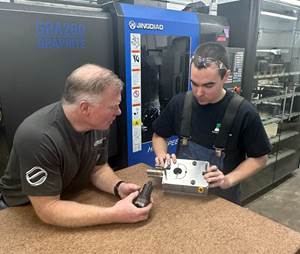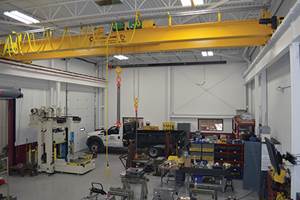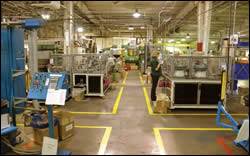Modular Mold Change System Dramatically Reduces Mold Changeover Times
A modular mold system has been developed that changes molds quickly and efficiently.
A modular mold system has been developed that changes molds quickly and efficiently. The user simply slides the modules out while the mold base remains in the machine—ready for the next product installation.
The modular mold change system (M.M.C.) was developed by Top Grade Molds (Mississauga, ON)—a designer and producer of plastic injection molds for the packaging industry.
According to Marketing & Project Engineering Manager John Plut, the company was responding to customers’ request to have a quick product changes system using a common mold base.
“This system can be optioned with any one of our molds,” Plut points out. “It uses a patent-pending mold module coupling system, that not only significantly reduces engagement and re-engagement times of mold modules, but completely eliminates the need to drain or disconnect water, air or electrical.”
Quick Changes
Available in either single face molds or stack molds, product changes with M.M.C.-equipped molds can be accomplished in as little as 20 minutes, shot-to-shot, Plut notes.
“It is not uncommon for a machine to be down for a significant portion of one working day, while a mold is being switched for a product change,” he explains.
“With this system, you can save yourself a day! The savings are then compounded more, when you consider that every similar product (size and shape), which is required can now be ordered to work with the existing M.M.C. base—saving the cost of an entire mold base and expensive hot runner.”
Reliability and ease of location was a major design consideration when conceiving the system. “Not only does the mold base need to be designed so that mold modules can be quickly removed, but the process must be simple and reliable,” Plut emphasizes.
“For this, we designed the M.M.C. mold base to guide the mold modules throughout the travel length. Using hardened cam followers and solid machined grooves, the mold base first guides the modules out of the quick coupling dry plates, then slowly and gradually separates the modules away from the mold base—providing a smooth friction-free ride out of the mold base.
“Conversely, the follower system keeps the module plates away from the mold base during lowering into the base, then firmly and securely brings the modules into the base and re-couples them with the quick coupling dry plates. The tapered guides in the modules themselves provide buffer for slight misalignment by the crane during positioning, and a solid wedge locking and leader pin system insures positive alignment and module engagement.”
According to Plut, the entire M.M.C. package was conceived with one goal in mind: efficiency. To that end, the company designed an auto-lift bar that is optional on all stack molds.
Just as the name implies, the auto-lift bar is a lifting bar that is designed to attach to the M.M.C. mold modules when the mold is closed, and then slides open with the modules during the disengagement process.
This bar allows the operator to connect the crane to both sides of the tool modules when closed during which the mold is most secure, then opens with the mold evenly on both sides and allows the simultaneous removal of both mold modules—compensating for the non linear movement of the cam follower guide groove.
Efficiency Equals Profits
“This system provides a robust and reliable mold base, which is a hallmark of our molds, while providing the ability to quickly and easily change out mold modules for minimal downtime, and maximum use of the injection molding machine,” Plut summarizes. “The results are greater output, more cost-effective tooling and greater profits.”
Related Content
Advances in P20 Steel Potentially Eliminates Need for Stress Relieving After Rough Cutting
Omega Tool Corp. compares conventional, new P20 grades side by side in production fascia tools, finds no downside.
Read MoreFive-Axis Graphite Mill With Automation Debottlenecks Electrode Machining
Five-axis electrode cutting enabled Preferred Tool to EDM complex internal screw geometry on an insert that otherwise would have had to be outsourced.
Read MoreThe Trifecta of Competitive Toolmaking
Process, technology and people form the foundations of the business philosophy in place at Eifel Mold & Engineering.
Read MoreCT Scanning Helps Micro Molder Reduce Cost of First Article Inspections
CT scanning services performed by 3D ProScan, a division of NyproMold Inc. provides MTD Micro Molding with accurate, high-resolution internal and external measurements performed about seven times faster and at significant cost savings.
Read MoreRead Next
Melt Management’s Role in a More Efficient Mold
One shop is finding great success—through special standardization—cutting scrap and runner costs by balancing the flow in the molds and reducing cycle times while using smaller, most cost-efficient presses.
Read MoreReasons to Use Fiber Lasers for Mold Cleaning
Fiber lasers offer a simplicity, speed, control and portability, minimizing mold cleaning risks.
Read MoreAre You a Moldmaker Considering 3D Printing? Consider the 3D Printing Workshop at NPE2024
Presentations will cover 3D printing for mold tooling, material innovation, product development, bridge production and full-scale, high-volume additive manufacturing.
Read More






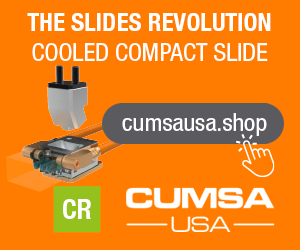

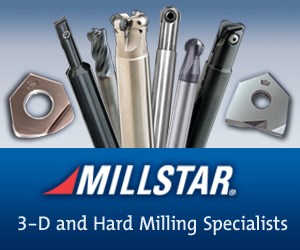
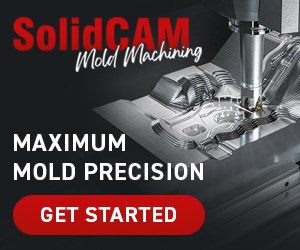
.png;maxWidth=300;quality=90)





